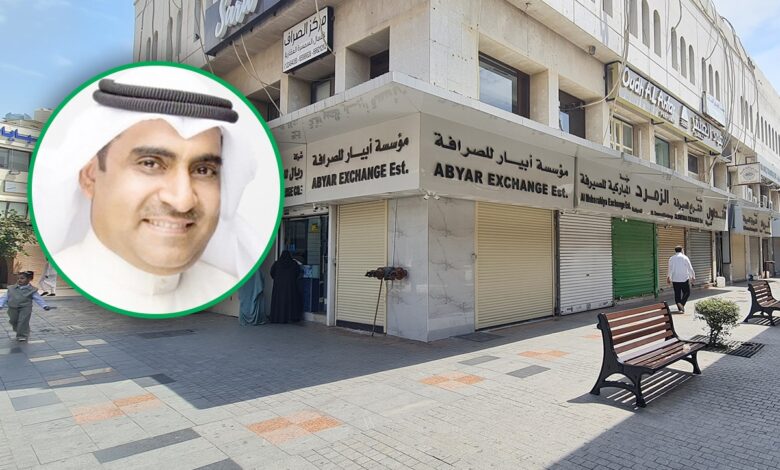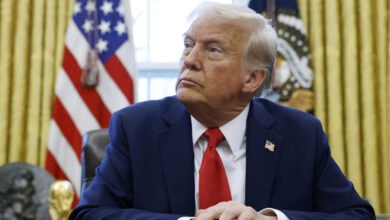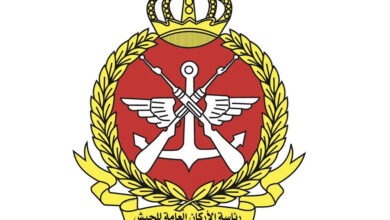
-
The Ministry of Commerce, led by Minister Khalifa Al-Ajeel, inspected exchange offices as the compliance deadline expired.
-
Exchange institutions complied with the law and closed their shops to meet the Central Bank’s requirements.
-
Majed Abu Al-Hassan of Gulf Union Exchange Foundation urged reconsideration of the two-million-dinar capital requirement, citing its impact on institutions.
Subsequent to the implementation of the decision regulating the work of exchange companies and institutions in accordance with the requirements of the Central Bank of Kuwait, many exchange institutions have closed their shops as the deadline for license holders to regularize their status has expired.
The Ministry of Commerce and Industry, led by Minister Khalifa Al-Ajeel, conducted inspection tours with three teams of money exchange offices across Kuwait as the deadline for correcting their status expired. Only one establishment was shut down for non-compliance, while the remaining establishments adhered to the decision and ceased operations.
The Director of the Technical Authority for Commodity Supervision and Pricing, and Acting Director of Consumer Protection at the Ministry of Commerce and Industry, Faisal Al Ansari, stated that exchange institutions implemented the law and closed their shops to ensure compliance with the ministerial resolution, which required them to meet the Central Bank’s requirements.
Al-Ansari stated to Al-Jarida that the establishments had not resumed operations and were complying with the decision until their status was rectified. He explained that inspection teams from the Ministry of Commerce had been deployed to all regions, based on instructions from Minister of Commerce and Industry, Khalifa Al-Ajeel, to ensure compliance with the Anti-Money Laundering Department’s disclosure requirements.
Furthermore, Al-Ansari explained that one shop in the Fahaheel area was closed, out of 138 establishments, praising the owners of the shops who complied with the instructions and refrained from resuming operations until their business was converted into a company.
Al-Ansari stated that the Commercial Supervision Department is committed to implementing the law, especially as it aligns with the directives of the Council of Ministers, urging institutions to consult the Central Bank of Kuwait to rectify their situations.
The Ministry of Commerce and Industry has been keen to implement and meet the requirements of the Financial Action Task Force (FATF) for Kuwait’s assessment of anti-money laundering and counter-terrorism financing, as one of the regulatory bodies responsible for enforcing the Anti-Money Laundering and Counter-Terrorism Financing Law. This assessment is crucial for the country’s future economic situation.
Moreover, the Ministry of Commerce had earlier called on companies and institutions to regularize their status in accordance with the Central Bank’s requirements, as the deadline for license holders to comply would expire on March 31, 2025.
This came based on the decision of the esteemed Council of Ministers No. (552) taken in its meeting No. (23-2024/2) held on 6/11/2024, regarding the transfer of supervision and control over exchange offices from the Ministry of Commerce and Industry to the Central Bank of Kuwait. It also involves implementing the provisions of Ministerial Resolution No. (233) of 2024, which regulates the work of exchange companies and institutions in accordance with the requirements of the Central Bank of Kuwait.
Capital Obstacle
Majed Abu Al-Hassan of the Gulf Union Exchange Foundation called for reconsidering the requirement that the capital required to convert an institution into a company be two million dinars, urging that the circumstances of the institutions be taken into account to facilitate their work.
Importantly, Abu Al-Hassan told Al-Jarida that the two-million-dinar capital requirement is a major obstacle for institutions in regularizing their status, noting that while all institutions support the implementation of the law, this requirement will make it difficult for them to comply.
Abu Al-Hassan stated that most exchange institutions and shops would be unable to provide the required funds, which could impact market supply and potentially affect currency exchange rates. He added that the Ministry of Commerce is closely monitoring the situation and remains committed to all decisions issued by the ministry over the years.
Regarding commitment, Abu Al-Hassan stated that the institutions have been committed over the past period, and the Gulf Exchange Foundation has not received a single violation regarding the collection of funds exceeding 3,000 dinars in cash, the commitment to the customer’s civil ID, and the use of K-Net. These are the same conditions required by the Central Bank for exchange companies.
Abu Al-Hassan explained that monopolies in the market must be prevented, adding that such a decision could force several companies out of the banking market. He expected the majority of institutions to exit the sector due to the difficulty of meeting these conditions.
The Ministry of Commerce and Industry announced the suspension of exchange operations and the prohibition of companies and institutions that do not comply with the requirements of the Central Bank of Kuwait.
The Ministry referred to Cabinet Resolution No. (552) issued on June 11, 2024, pursuant to which the responsibility for supervising and controlling exchange offices was transferred from the Ministry of Commerce and Industry to the Central Bank of Kuwait.
Significantly, the Ministry pointed out that this decision will be activated through Ministerial Resolution No. (233) of 2024, which regulates the work of exchange companies and institutions in accordance with the new requirements set by the Central Bank of Kuwait, and grants license holders of exchange companies and institutions a specific period to adjust their conditions in accordance with these requirements, which ended on March 31, 2025.
The Ministry clarified that it will continue to suspend and prohibit commercial activity for companies and institutions that have not complied with the new regulations. It also stated that institutions must amend the legal entities of all exchange companies and institutions operating under the Ministry of Commerce. If they wish to continue operating, they must submit an application to the Ministry to establish an exchange company with a capital of no less than two million dinars, fully paid.
The number of exchange offices engaged in currency exchange activities, buying and selling currencies in the local market under the supervision of the Ministry of Commerce and Industry, was identified as 138 companies and institutions.
Importantly, during the Ministry’s inspectors’ tours on the first day after the deadline, the majority of exchange shops were found closed and not operating. Only one violation was detected during yesterday’s inspections, and inspection campaigns on exchange shops by the Ministry’s inspectors will continue.












